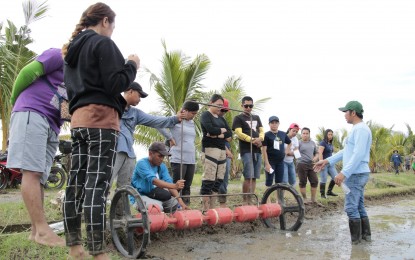
FIELD TRAINING. Rice specialists and farmer-leaders in Nueva Ecija are trained on the use of a drum seeder, a piece of gender-friendly farm equipment for direct seeding. The activity is part of the training being conducted by the Philippine Rice Research Institute (PhilRice) and the Philippine Center for Postharvest Development and Mechanization (PhilMech) to help farmers become competitive. (File photo by PhilRice)
SCIENCE CITY OF MUNOZ, Nueva Ecija — The Philippine Rice Research Institute (PhilRice) and Philippine Center for Postharvest Development and Mechanization (PhilMech) are conducting various training for rice specialists, extension workers, and farmer-leaders to make farmers competitive.
The move is in line with the Rice Competitiveness Enhancement Fund (RCEF) program of the Department of Agriculture.
Dr. Glenn Ilar, PhilRice training coordinator, said on Tuesday that he training will make rice specialists, extension workers and farmer-leaders in educating farmers cope up with the challenge on the availability of cheaper imported rice in the local market.
“The training for farmer-leaders and extension workers of Luzon amplifies the program’s extension services. Farmer-leaders and extension workers are now updated on farm technologies and techniques, especially on the use and production of quality seeds and farm machines, which they will impart to the farmers by conducting Farmers Field School,” he said.
Ilar said at least 30 personnel from the Agricultural Training Institute, regional field offices of the DA, Technical Education and Skills Development Authority, and PhilRice underwent a rice specialist training course from April 29 to Oct. 18 in preparation for the implementation of the RCEF program in their areas.
He said that PhilRice has also recently trained about 85 regional and provincial RCEF coordinators who will assist in the RCEF seed distribution program.
“Farmer-trainees shared rice production-related technologies such as pest and nutrient management to their fellow farmers and that they are also tapped to teach young farmers,” he said.
Ilar added that PhilRice has also trained rebel returnees, military personnel, retirees, and out-of-school-youth on rice and rice-based production.
With funding for six years, RCEF serves as farmers’ safety net under the Rice Tariffication Law, in which collected tariffs are used to improve Filipino rice farmers’ competitiveness. (PNA)
